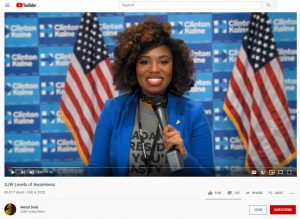Video Excerpts Qualify as Fair Use (and Another 512(f) Claim Fails)–Hughes v. Benjamin
 Hughes is a YouTuber. She made a 10 minute video of Hillary Clinton’s election night party called “We Thought She Would Win” and posted it to her channel. Benjamin also is a YouTuber, but on the opposite end of the political spectrum. He created a 2 minute video called “SJW Levels of Awareness,” which consisted solely of 6 excerpts from Hughes’ video without any additional commentary. He posted this video to his channel, which contained other videos criticizing the Left, feminists, and Black Lives Matter. Hughes sent a takedown notice to YouTube, which YouTube honored. Benjamin counternoticed, which YouTube apparently honored as well. Hughes sued Benjamin for copyright infringement and a 512(f) violation due to his counternotice. The court dismisses both claims.
Hughes is a YouTuber. She made a 10 minute video of Hillary Clinton’s election night party called “We Thought She Would Win” and posted it to her channel. Benjamin also is a YouTuber, but on the opposite end of the political spectrum. He created a 2 minute video called “SJW Levels of Awareness,” which consisted solely of 6 excerpts from Hughes’ video without any additional commentary. He posted this video to his channel, which contained other videos criticizing the Left, feminists, and Black Lives Matter. Hughes sent a takedown notice to YouTube, which YouTube honored. Benjamin counternoticed, which YouTube apparently honored as well. Hughes sued Benjamin for copyright infringement and a 512(f) violation due to his counternotice. The court dismisses both claims.
Fair Use
The court says Benjamin’s video is fair use.
- Nature of Use. The video title (referencing “SJW”) signaled that Benjamin’s video was for commentary/criticism. “‘SJW’ or ‘Social Justice Warrior’ has sufficiently entered the modern lexicon such that there can be no serious dispute as to its pejorative meaning in this context.” Plus, viewers familiar with Benjamin’s other videos would contextualize the video accordingly.
- Nature of the Work. “the second fair use factor is essentially neutral and of little import” (I wish I had a nickel for every time a court has said that).
- Amount/Substantiality of Portion Taken. Benjamin took 20% of Hughes’ video, but “although the selected excerpts were important to Hughes’s video (at least as important as any other part of her video), they were also linked to the critical purpose of SJW Levels of Awareness.”
- Market Effect. “there is no danger that SJW Levels of Awareness will usurp the market of progressive commentaries such as We Thought She Would Win. Benjamin’s target audience (generally political conservatives and libertarians) is obviously not the same as Hughes’s target audience (generally political liberals). Moreover, although SJW Levels of Awareness is comprised entirely of portions of We Thought She Would Win, there is no reason to think that Hughes’s audience will abandon her progressive YouTube channel to watch the derisively-titled SJW Levels of Awareness on a conservative YouTube channel simply because it contains parts of her work.”
512(f)
The fact that Benjamin’s use qualified as fair use necessarily implies that his counternotice didn’t misrepresent. That’s a pretty legit reason for the 512(f) claim to fail, but still, chalk this case up as another 512(f) loss.
Implications
I think this is a significant ruling. The judge says that a video composed solely of excerpts of a precedent video can qualify as fair use on a 12(b)(6) motion to dismiss. Fair use rulings on a motion to dismiss are relatively rare; such rulings when the defendant didn’t add any commentary (other than the title) strike me as even rarer. In contrast, the rules are not as clear-cut when it comes to reaction videos. For example, the Hosseinzadeh v. Klein ruling also found fair use, but only on summary judgment, even though the criticism/commentary was so much more evident than with Benjamin’s video. Furthermore, we’ve seen courts struggle with videos that include brief depictions of third party screenshots, even though those cases are ridiculous. So it wasn’t at all obvious that Benjamin would get a 12(b)(6) motion to dismiss. I think that will help future defendants.
Still, I can see why others might view this ruling as troubling. First, Benjamin’s channel content is normatively objectionable to many people, including me, so it’s tempting to want IP law to condemn it. I felt that way in the Goldman v. Breitbart case, where I couldn’t believe that I was actually rooting for Breitbart (only on the legal merits, but still…). However, if you’re a fair use advocate, you have to embrace its application even when the defendants have odious views. Second, there is an obvious race and gender dimension to this case. Hughes is an African-American female, and the judge applied a very broad conception of fair use to her copyright. If plaintiffs with different demographics had made identical claims, would fair use be interpreted equally expansively against them? I could see why folks in the critical studies community might wonder about this, even though the opinion didn’t evidence any bias, and I think it reached the right result.
Case Citation: Hughes v. Benjamin, 2020 WL 528704 (S.D.N.Y. Feb. 3, 2020). This opinion was by Judge Sullivan of the Second Circuit, sitting by designation.
UPDATE: The judge awarded Benjamin $38k in attorneys’ fees per 17 USC 505, even though Benjamin also raised a legal defense fund of $120k via GoFundMe (and now I’m wondering where that money will go). As I read the attorneys’ fee opinion, the critical studies critiques of this case kept nagging at me. As before, the opinion exhibited no obvious bias and was well-grounded in the law. Yet, I can’t help but wonder whether a fee shift would have been awarded if the plaintiff was a white male and the defendant a black female.

Pingback: News of the Week; February 5, 2020 – Communications Law at Allard Hall()